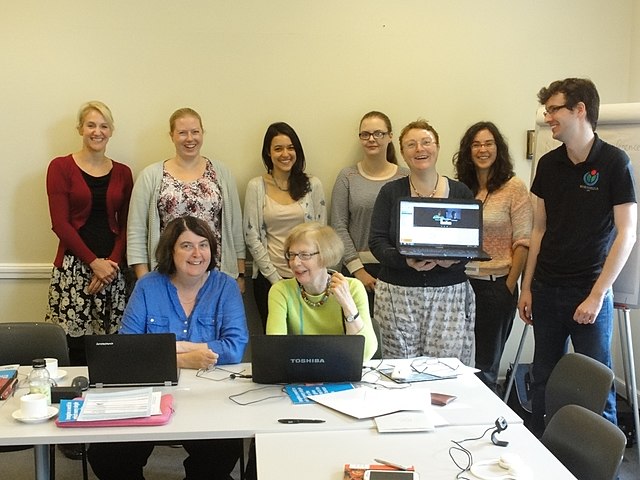
This post was written by Claire Millington, a Classics PhD student at Kings College London. It was first published on her blog here
This week, after a lot of planning and persuading people to get involved, I ran a Wikipedia editathon to create and improve the pages of women who have been important to classics disciplines. (And I mean disciplines – philology, archaeology, history, ancient theatre, epigraphy, numismatics – the list goes on.)
The idea came about after I went to a conference about over a dozen women in modern history who have made astounding contributions to classics – but who I’d never heard of! Even though I unknowingly am influenced by their work pretty much every day I study.
Astonishingly, I realised that it is not a last-century development that women have been grappling with the thorniest problems of translation, publishing, teaching, engaging in classics scholarship at the highest levels – even gaining public recognition for this – but that women have been doing this throughout the modern period. So, having learned something and fixed my own misperceptions, I wanted to do something that would in a tiny way make it easier for other people to also see what – and when – were these achievements. Where better to do this than in the pages of Wikipedia?
The conference offered a list of names of classicists who deserved good Wikipedia pages, and I started to contact people to see who else I didn’t know was notable. Academics were enthusiastic, suggesting more names – and adding archaeologists to the list.* The Institute of Classical Studies gave me a room and morning coffee. Wikimedia provided trainers and lunch. University libraries loaned me enough books to fill two suitcases, ensuring we’d excellent resources to use on the day – particular thanks are due to the ICS, Senate House and the Institute of Archaeology libraries. The brilliant Dr Rosie Wyles who had organised the original conference agreed to come to tell us about ‘Madame Dacier: 17th-century champion for access’.
I tweeted and emailed, and waited, hoping, that a sensible number of people would turn up.
I need not have worried. Some nine Wikipedia ‘newbies’ came, most in person, two via Skype, and were trained by three Wikimedia trainers. The morning was intensive, as we learned the technical aspects of editing Wikipedia, and discussed more generally the requirements of any encyclopaedia, to be a summary and signpost of what already exists; a means of disseminating existing information rather than a place to create new knowledge.
In practical terms this means avoiding creating original research on its pages, giving a neutral point of view and avoiding conflicts of interest – important for scholars who are experts on their life’s work, but who also have personal interests at stake.
We started editing the pages selected, people expressing surprise that there were whole books published about people who yet were barely mentioned in Wikipedia. This was something the editathon aimed to put right and the room buzzed as we created and improved these scholars’ pages.
Still, by two o clock, we were ready for a change of pace and to listen to Dr Wyles’ talk, arguing that Madame Dacier had not only been a brilliant classicist, but had also in some respects been influential in opening up the study of classics to women.
With another editing session in the afternoon we were able to make a decent stab at our list. Margery Venables Taylor, archaeologist, president and long-time secretary of the Roman Society, had a Wikipedia page created, as did Roman epigraphist, Joyce Reynolds. The pages of Eugénie Sellers Strong, Anna Maria van Schurman, Gisela Richter, Betty Radice, Virginia Grace, and, of course, Anne Dacier, all received editors’ attention.
Was it a success? In terms of what it set out to do, I think so. A lot of enthusiasm and goodwill was also generated, and it showed how classicists and academics can get involved – as many do – with the great resource that is Wikipedia to share what we know about our particular subjects.
And I hear that further editathons are being planned on academic subjects, which I hope will bear fruit!
*The original conference focused on philologists as there has been more scholarly work already done on archaeologists – this seems perfectly reasonable to me.






I was there and thought the day went brilliantly, not least thanks to Claire’s hunting down of resources. Mary Beard tweeted about the event the evening before, blessing it as “much needed”, which got 50+ retweets overnight. I gratefully asked if there was any particular woman she’d like us to look at. She suggested Eugénie Sellers Strong, and when I looked, yes there was an article, but very much a stub, just three or four sentences. Oh dear, I thought, it will be quite difficult to find information on this obscure archaeologist. And then we looked at the cornucopia pouring out of Claire’s suitcases, and lo and behold there were two copies of a full-length book on her, written more recently than Wikipedia’s inception: not so obscure. In other words, this woman’s life has been through the academic mill and come out the other end as a biography, and no one who read the book had summarised it for Wikipedia, and no Wikipedia editor had sought to flesh out the article. We made a start.
Wonderful stuff and well organised Claire – now for the next one 🙂